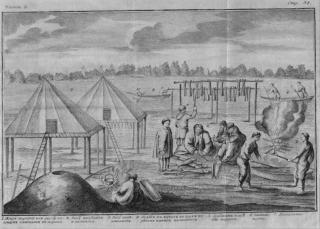Topic
Food in the history of Siberia
Since the very first Russian and European encounters with Siberia, Siberian Indigenous food has been the subject of cultural curiosity, physical contact, intellectual interpretations, and colonial influence. The project explores the role that food played in the process of colonization and exploration of Siberia in the 17th and 18th centuries and the ways in which food impacted the relationships between Indigenous peoples and newcomers.

Absorbing the Asian Frontier: Food and Food-Related Knowledge in 17th and 18th century Siberia
The project investigates the role that food and food-related practices, knowledge and beliefs played in the exploration of Siberia and its incorporation into the Muscovy and the Russian Empire in the seventeenth and eighteenth centuries. Relying on the travelogues, scientific treatises, chronicles, expedition materials, official decrees and documents of colonial administration, the project explores how food participated in creating an image of Siberia and its Indigenous population, impacted the interaction between the locals and the strangers, and impacted the processes of Siberia’s colonization and exploration. Not only did descriptions of Siberian foodways mirror cultural norms, religious views and bodily knowledge of the writers, but they also reflected larger ideologies of (pre)Enlightenment times and referred to fundamental issues such as human nature, statehood, and civilization. At the same time, dietary encounters and experiences in Siberia, as well as Indigenous food knowledge challenged both the bodies and minds of colonizers, scientists, missionaries, and travellers, making them adopt local diets, rethink their attitude to food and body, or question their understanding of civility. Building on existing research in Russian imperial history, Siberian ethnography, history of food and colonialism, as well as post- and decolonial scholarship, the project centres food in the research on the intellectual and everyday history of Siberian conquest.
